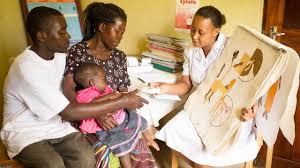524 total views today
By Abujah Racheal
The recent withdrawal of USAID’s funding for family planning in Nigeria has sparked concerns among stakeholders, who warned that the country’s reproductive health system is at a crossroads.
The stakeholders raised this concern at the 13th Annual International Conference of the Population Institute of Nigeria in Abuja on Monday.
They said that for years, Nigeria had relied heavily on donor support to sustain its family planning programmes.
According to them, this has ensured that millions of women have access to contraceptives and reproductive health services. But that support is rapidly disappearing, leaving the country at a critical crossroads.
A panel discussion on the Impact of Cuts to Family Planning Funding and Its Implications for Nigeria, organised by the Development Research and Project Centre (dRPC), revealed the depth of concern over Nigeria’s reproductive healthcare.
The News Agency of Nigeria (NAN) reports that the recent withdrawal of donor funding for family planning in Nigeria threatens to ripple through the entire healthcare system.
For years, international partners like USAID have shouldered the cost of contraceptive services, allowing millions of Nigerian women to access free family planning at public facilities.
But with the funding drying up, the burden is shifting to the private sector, where out-of-pocket expenses are expected to soar.
Dr Ejike Oji, Chairman of the Association for the Advancement of Family Planning in Nigeria, recounted how he recently received a letter confirming the worst fears of many in the sector.
“The letter, dated January 20, informed me that USAID would be halting its funding for a key family planning programme, pending a 90-day review,” Oji said.
According to him, this move follows a growing trend of international donors pulling out, citing Nigeria’s failure to deliver measurable progress despite years of investment.
“We were in a meeting years ago when a USAID official bluntly asked us, “Why should we keep funding you when we are not seeing results?”
“Now, they have finally decided to walk away,” he said.
He said that without donor support, contraceptive supplies would dwindle, leading to a surge in unintended pregnancies, unsafe abortions, and increased maternal deaths.
He said that Nigeria’s reproductive health system, already fragile, could collapse under the strain, undoing years of progress.
“At the heart of the issue is Nigeria’s lack of financial commitment.
“After pledging three million dollars annually for family planning at the 2012 London Summit, the government increased it to four million dollars under Prof. Isaac Adewole as the minister of health.
“But since 2020, there have been no releases, leaving the sector in crisis,” he said.
Ijeoma Nwankwo, a Pharmacist and Senior Programme Officer for the Pharmaceutical Society of Nigeria Foundation (PSNF), said that the impact would be most severe for underserved communities.
“Many Patent and Proprietary Medicine Vendors (PPMVs) working in hard-to-reach areas depend on this funding to provide services.
“With donor cuts, those free services will either shrink or disappear entirely,” she said.
Nwankwo, a leading advocate in reproductive health, said that this shift was particularly troubling because over 60 per cent of Nigerian women already accessed family planning through private providers.
She said that about 80 per cent of Nigerians seek healthcare first in the private sector.
She cautioned that without adequate government support, the increased reliance on private providers could spell disaster.
“Can the private sector handle the increased demand without significant government intervention?
“Already, regulatory oversight is weak, and data from private facilities remains chaotic, making it difficult for policymakers to track service delivery or ensure quality care.
“If 80 per cent of Nigerians rely on private providers, and yet the government is not properly funding regulators like the Pharmacy Council of Nigeria, what happens next?
“Are we leaving the healthcare of millions to chance?”
Nwankwo suggested integrating family planning into Nigeria’s health insurance schemes.
“Lagos State, with its relatively robust insurance programme (LASHMA), is already exploring ways to cover family planning services under its health insurance plan.
“If successful, this model could be replicated nationwide,” she said.
She also underscored the role of technology in bridging the gap.
“We need to harness digital solutions, whether by using drones to deliver contraceptives to remote areas or expanding online consultations through WhatsApp and websites,” she said.
Dr Stanley Ilechukwu, a Community Advocate, called for a strategic shift in investment by prioritising state and community-level funding over-reliance on federal allocations or international donors.
Ilechukwu said that investing at least one million Naira per Primary Healthcare Centre (PHC) to strengthen its capacity to provide essential reproductive health services was a possible solution.
“This level of investment would go a long way in supporting PHCs to sustain family planning services,” he said.
For community-based organisations, he said that the focus should now shift away from federal-level advocacy.
He called for efforts to be centred on building resilience at lower levels of government, ensuring that states and local communities take ownership of their healthcare systems.
“The next five years should be about strengthening state and local funding structures.
“If we build this capacity now, we can gradually reduce dependence on international funding. Over time, we can sustain these interventions ourselves,” he said.
Dr Stanley Ukpai, Director of Projects at dRPC, called for a fundamental shift in strategy.
“Our advocacy messaging has to change. Now that we are in a crisis, we need bold and urgent solutions,” he said.
Ukpai said that the government must step up, through improved health financing, stronger regulatory frameworks, or leveraging technology to ensure that family planning services remain accessible.
He said that without immediate intervention, millions of Nigerian women may find themselves without the reproductive healthcare they need, further deepening the country’s maternal health crisis. (NAN)(www.nannews.ng)
Edited by Kadiri Abdulrahman













